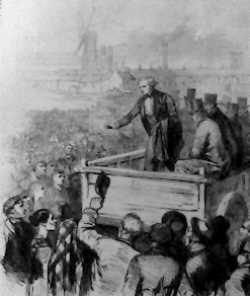Lancashire became the wealthiest county in England during the Victorian era (1837-1901). The Industrial Revolution brought fame and fortune to a few, but misery for the masses. Mill and factory owners and merchants grew rich and powerful, as Lancashire became a huge industrial powerhouse. At the peak, Lancashire was producing 82 per cent of the world's cotton cloth. Some 330,000 people were employed in cotton production, of which just over half were women and teenage girls and about 10 per cent children. Social reformer Joseph Livesey claimed that the conditions of the poor orphans working at Penwortham Mill, Preston, were worse than for American slaves. A judge in Preston, in 1846, sentenced an eight-year old boy to seven years deportation for allegedly stealing nine pence worth of copper.
The rapid progress was not without setbacks, slumps and strikes. The ruling class dealt ruthlessly with any worker who questioned the system.
During the 1853-4 'Great Lockout', when the owners closed the mills, Charles Dickens stayed at the Bull and Royal Hotel in Preston and loosely based his account of Coketown in the novel 'Hard Times' on the town. The dispute became internationally famed – Karl Marx thought that revolution might begin here and said “our St Petersburg is at Preston’.
 |
George Cowell, leader of the operatives during the “Great Lockout” of 1853-54, addressing workers in Chadwick’s Orchard. |
